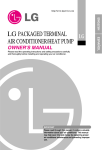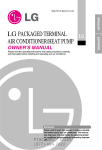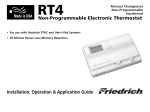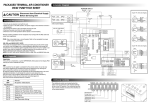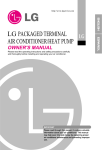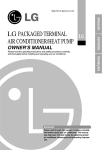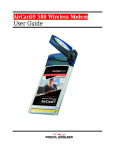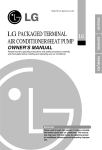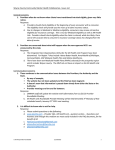Download LG PACKAGED TERMINAL AIR CONDITIONER/HEAT PUMP User's Manual
Transcript
http://www.lgservice.com
ENGLISH
OWNER'S MANUAL
Please read the operating instructions and safety precautions carefully
and thoroughly before installing and operating your air conditioner.
IMPORTANT
Please read through this manual. It contains valuable
information about your air conditioner. This manual
may help save time and money by explaining proper
air conditioner maintenance and preventing improper
use.
ESPAÑOL
LG PACKAGED TERMINAL
LG
AIR CONDITIONER/HEAT PUMP
Packaged Terminal Air Conditioner/Heat Pump Owner's Manual
TABLE OF CONTENTS
Safety Precautions..........................3
FOR YOUR RECORDS
Write the model and serial numbers here:
Before Operation .............................7
Model #
Serial #
Introduction ....................................8
You can find them on a label on the side of each unit.
Dealer's Name
Electrical Safety ..............................9
Date Purchased
■ Staple your receipt to this page in the event you need it
to prove date of purchase or for warranty issues.
Installation ....................................11
Control Locations..........................13
Maintenance and Service ............19
READ THIS MANUAL
Inside you will find many helpful hints on how to use and
maintain your air conditioner properly. Just a little
preventive care on your part can save you a great deal of
time and money over the life of your air conditioner.
You'll find many answers to common problems in the chart
of troubleshooting tips. If you review our chart of
Troubleshooting Tips first, you may not need to call for
service at all.
PRECAUTION
• Contact an authorized service technician for repair or
maintenance of this unit.
• Contact the installer for installation of this unit.
• The air conditioner is not intended for use by young
children or invalids without supervision.
• Young children should be supervised to ensure that
they do not play with the air conditioner.
• When the power cord is to be replaced, replacement
work shall be performed by authorized personnel
only using only genuine replacement parts.
• Installation work must be performed in accordance
with the National Electric Code by qualified and
authorized personnel only.
2 Room Air Conditioner
Safety Precautions
Safety Precautions
WARNING
This symbol indicates the possibility of death or serious injury.
CAUTION
This symbol indicates the possibility of injury or damage to properties only.
■ Meanings of symbols used in this manual are as shown below.
Don't do this!
Be sure to follow the instruction.
WARNING
■ Installation
Don’t use a power cord, a
plug, or a loose socket
which is damaged.
• It may cause a fire or electrical
shock.
Always plug into a grounded
outlet.
• It may cause a fire or electrical
shock.
Do not modify or extend the
power cord length.
• It will cause electric shock or fire
due to heat generation.
Do not disassemble or
modify products.
Be caution when unpacking
and installing.
Do not use the power cord near
flammable gas or combustibles
such as gasoline, benzene,
thinner, etc.
• It may cause failure and
electric shock.
• Sharp edges may cause
injury.
• It may cause explosion or fire.
Gasolin
Owner’s Manual 3
ENGLISH
To prevent injury to the user or other people and property damage, the following instructions
must be followed.
■ Incorrect operation due to ignoring instruction will cause harm or damage. The seriousness
is classified by the following indications.
Safety Precautions
■ Operation
Do not place objects on the
power cord. Protect the cord
from being pinched or
damaged.
• There is danger of fire or electric
shock.
Do not place the power cord
near a heater.
• It may cause fire and electric
shock.
Use a dedicated circuit for
this appliance.
Take the power plug out if
necessary, holding the end
of the plug and do not touch
it with wet hands.
• An overloaded circuit is a fire
hazard.
• It may cause a fire or electrical
shock.
Do not allow water to run
into electric parts.
Use a soft cloth to clean. Do
not use wax, thinner, or a
strong detergent.
• It will cause failure of machine or
electric shock.
• The appearance of the air
conditioner may deteriorate,
change color, or develop
surface flaws.
x
Wa Thinner
Unplug the unit if strange
sounds, odors, or smoke
come from it.
Do not open the suction
inlet grill of the product
during operation.
• It could represent a fire hazed.
• Otherwise, it may electrical
shock and failure.
Ventilate the room well when
using this appliance
together with a stove, etc.
• Oxygen depletion could occur.
4 Room Air Conditioner
Turn off the power and
breaker when cleaning the
unit.
• Moving parts could cause injury.
If water enters the product, turn
off the the power switch of the
main body of appliance. Contact
service center after taking the
power plug out from the socket.
Turn off the main power
switch when not using it for
a long time.
• Prevent accidental startup and
the possibility of injury.
Safety Precautions
Do not operate or stop the
unit by inserting or pulling
out the power plug.
Hold the plug by the end
when taking it out.
• It may cause electric shock and
damage.
• It will cause electric shock or fire.
When gas leaks, open the
window for ventilation
before operating the unit.
• Otherwise, it may cause an
explosion and a fire.
Do not operate with wet
hands or in damp
environment.
• It will cause electric shock.
Never touch the metal parts
of the unit when removing
the filter.
• They are sharp and may cause
injury.
CAUTION
■ Installation
Install the product so that the noise or
exhaust from the outdoor unit may not
cause any damage to the neighbors.
• Be considerate of your neighbor.
Be sure the product is level front-to-back
and side-to-side when installing.
• It may cause vibration or water leakage.
Owner’s Manual 5
ENGLISH
• It will cause electric shock or fire
due to heat generation.
Do not damage or use an
unspecified power cord.
Safety Precautions
■ Operation
Do not put a pet or house
plant where it will be
exposed to direct air flow.
Do not block the inlet or
outlet of air flow.
Use a soft cloth to clean. Do
not use wax, thinner, or a
strong detergent.
• It is not good to sit in the draft.
• It may cause product failure.
• The appearance of the air
conditioner may deteriorate,
change color, or develop surface
flaws.
Do not step on the
indoor/outdoor unit and do
not put anything on it.
• It may cause an injury through
dropping of the unit or falling
down.
Be cautious not to touch the
sharp edges when
installing.
• A severe cut or other injury could
result.
6 Room Air Conditioner
Always insert the filter
securely.
Clean it every two weeks.
• Operation without filters will
cause failure.
Avoid excessive cooling and
perform ventilation
sometimes.
• Use the ventilation function to
circulate air without cooling or
heating
Do not drink water drained
from the air conditioner.
• It contains every contaminant
condensed from the air and could
cause health issues.
Do not insert hands or other
objects through the air inlet
or outlet during operation.
• Electrical and moving parts
could cause shock or injury.
Before Operation
Before Operation
1. Contact an installation specialist for installation.
This is NOT a do-it-yourself project.
2. Plug in the power plug properly.
3. Use a dedicated circuit.
4. Do not use an extension cord. Consult a professional installer or electrician.
5. Do not start/stop operation by plugging/unplugging the power cord.
6. If the cord/plug is damaged, replace it with only an authorized replacement
part.
Usage
1. Being exposed to direct airflow for an extended period of time could be
hazardous to your health. Do not expose occupants, pets, or plants to direct
airflow for extended periods of time. In other words, don't sit in the draft.
2. Due to the possibility of oxygen deficiency, ventilate the room when used
together with stoves or other heating devices.
3. Do not use this air conditioner for non-specified special purposes (e.g.
preserving precision devices, food, pets, plants, and art objects). Such usage
could damage the items.
Cleaning and Maintenance
1. Do not touch the metal parts of the unit when removing the filter. Injuries can
occur when handling sharp metal edges.
2. Do not use water to clean inside the air conditioner. Exposure to water can
destroy the insulation, leading to possible electric shock.
3. When cleaning the unit, first make sure that the power and breaker are turned
off. The fan rotates at a very high speed during operation. There is a
possibility of injury if the unit’s power is accidentally triggered on while
cleaning inner parts of the unit.
Service
For repair and maintenance, contact your authorized service dealer.
Owner’s Manual 7
ENGLISH
Preparing for Operation
Introduction
Introduction
Symbols Used in this Manual
This symbol alerts you to the risk of electric shock.
This symbol alerts you to hazards that could cause harm to
the air conditioner.
NOTICE
This symbol indicates special notes.
Features
This appliance should be installed in accordance with the National Electric Code.
THE SLEEVE AND THE REAR GRILLE
(Available as an option)
VERTICAL AIR DEFLECTOR
(Horizontal Louver)
SLEEVE ASSEMBLY
(Including Aluminum Rear Grille)
REAR GRILLE
(Aluminum Rear Grille)
AIR FILTER
R
O
O
D
N
I
INLET GRILLE
(Air Intake)
EXPANDED METAL GRILLE
(Superior for a performance)
8 Room Air Conditioner
Electrical Safety
Electrical Safety
115V~
230V~
265V~
Power cord may include a current
interrupter device. A test and reset button
is provided on the plug case. The device
should be tested on a periodic basis by
first pressing the TEST button and then
the RESET button. If the TEST button
does not trip or if the RESET button will
not stay engaged, discontinue use of the
air conditioner and contact a qualified
service technician.
NOTICE
The shape may be different according to its model.
Use Wall Receptacle
Standard 208/230V, 3-wire
grounding receptacle rated 15A
Standard 208/230V, 3-wire
grounding receptacle rated 20A
Standard 208/230V, 3-wire
grounding receptacle rated 30A
Power Supply
Use 15 AMP. time
delay fuse or 15 AMP.
Circuit breaker.
Use 20 AMP. time
delay fuse or 20 AMP.
Circuit breaker.
Use 30 AMP. time
delay fuse or 30 AMP.
Circuit breaker.
NOTICE
DO NOT USE AN EXTENSION CORD on 230,
208, and 230/208 Volt units.
All wiring should be made in accordance with local
electrical codes and regulations.
Aluminum house wiring may pose special
problems. Consult a qualified electrician.
Never push the test button during
operation
Otherwise this plug can damaged.
This device contains chemicals, including
lead, known to the State of California to
cause cancer, birth defects, or other
reproductive harm.
Wash hands after handling.
Do not remove, modify, or immerse this plug.
If this device trips, the cause should be
corrected before further use.
The conductors inside this cord are
surrounded by shields, which monitor
leakage current.
These shields are not grounded.
Periodically examine the cord for any
damage. Do not use this product in the
event the shields become exposed.
Avoid shock hazard! This unit cannot
be serviced. Opening the tamperresistant, sealed portion of the unit
voids all warranties and performance
claims. This unit is not intended to be
an ON/OFF switch.
Owner’s Manual 9
ENGLISH
Electrical Data
Electrical Safety
Electrical Safety
IMPORTANT
(PLEASE READ CAREFULLY)
FOR THE USER'S PERSONAL SAFETY, THIS
APPLIANCE MUST BE PROPERLY GROUNDED
The power cord of this appliance is equipped with a
three-prong (grounding) plug. Use this with a standard
three-slot (grounding) wall power outlet to minimize the
hazard of electric shock. The customer should have
the wall receptacle and circuit checked by a qualified
electrician to make sure the receptacle is properly
grounded.
Attaching the adapter ground terminal to the wall
receptacle cover screw does not ground the
appliance unless the cover screw is metal, and not
insulated, and the wall receptacle is grounded
through the house wiring. The customer should
have the circuit checked by a qualified electrician to
make sure the receptacle is properly grounded.
Disconnect the power cord from the adapter, using
one hand on each. Otherwise, the adapter ground
terminal might break. DO NOT USE the appliance with
a broken adapter plug.
DO NOT CUT OR REMOVE THE THIRD (GROUND)
PRONG FROM THE POWER PLUG.
A. SITUATIONS WHEN THE APPLIANCE WILL BE
DISCONNECTED OCCASIONALLY
Because of potential safety hazards, we strongly
discourage the use of an adapter plug. However, if you
wish to use an adapter, a TEMPORARY
CONNECTION may be made. Use UL-listed adapter,
available from most local hardware stores.
The large slot in the adapter must be aligned with the
large slot in the receptacle to assure a proper polarity
connection.
B. SITUATIONS WHEN THE APPLIANCE WILL BE
DISCONNECTED OFTEN
Do not use an adapter plug in these situations.
Unplugging the power cord frequently can lead to an
eventual breakage of the ground terminal. The wall
power outlet should be replaced by a three-slot
(grounding) outlet instead.
USE OF EXTENSION CORDS
Because of potential safety hazards, we strongly
discourage the use of an extension cord. However, if
you wish to use an extension cord, use a CSA
certified/UL-listed 3-wire (grounding) extension cord.
10 Room Air Conditioner
Installation
Installation
Dimension of air conditioner
• There are sharp edges that can cause serious cuts.
• When lifting the air conditioner, it is HEAVY.
Use 2 people to lift.
1,066 mm
(42")
For existing sleeve, you should measure the wall
sleeve dimensions.
You can install the new air conditioner according to
these installation instructions to achieve the best
performence. All wall sleeves used to mount the new air
conditioner must be in good structural condition and
have the rear grille that securely attaches to the sleeve
or the flange of the sleeve to secure the new air
conditioner.
• To avoid vibration and noise, make sure the unit is
installed securely and firmly.
406 mm
(16")
318 mm
(12 1/2")
505 mm
(20")
Dimension of sleeve assembly (optional)
When installing the sleeve, make certain there is
nothing within 20" of the back that would interfere with
heat radiation and exhaust air flow.
1066 mm
(42")
406 mm
(16")
318 mm
(12 1/2")
NOTICE To maintain the best
performance of the LG PTAC,
an insulation strip must be
attached. The insulation strip
is provided with the box.
Refer to the diagram below.
INSULATION
WALL
COOLED
AIR
SLEEVE
HEAT
RADIATION
INTAKE
AIR
1/4" Bubble
of the level
WALL
Over 20"
1) Take out the insulation strip from the upper packing.
2) Attach the insulation strip onto the rear upper side of
the wall sleeve.
3) If anyone would like to improve unit energy efficiency,
it is recommended the change of outside grille for an
unit protection and an addition of a plastic rear grille.
(This is optional.)
280 mm
(11")
Front
Insulation Strip
Sleeve
Rear
Owner’s Manual 11
ENGLISH
How to Install the Unit
Installation
• UNIT INSTALLATION
1. Remove the shipping screw from the ventilation door.
2. Remove the front gille by pulling it out at the bottom
to release it, then lift it up along the unit top front.
3. Slide the unit into the wall sleeve and secure with
6 screws through the unit flange holes.
4. Reinstall the front grille by hooking the top over the
unit top, then pushing it in at the bottom.
12 Room Air Conditioner
Control Locations
Control Locations
ENGLISH
Manual Controls
TEMPERATURE CONTROL
Set the Thermostat control to the desired
temperature mark 5 (the mid-point is a good
starting position). If the room temperature is not
satisfactory after a reasonable time, adjust the
control to a cooler or warmer setting, as
appropriate.
OPERATION MODE SELECTOR
OFF
Turns air conditioner off.
LOW FAN
Low speed fan operation without cooling.
HIGH FAN
High speed fan operation without cooling.
LOW COOL Cooling with the low speed fan operation.
HIGH COOL Cooling with the high speed fan
operation.
LOW HEAT
Heating with the low speed fan operation.
HIGH HEAT Heating with the high speed fan
operation.
• VENTILATION
The ventilation lever is located to the lower left side
of the unit.
The ventilation lever must be in the CLOSE position in
order to maintain the best cooling conditions.
When fresh air is necessary in the room, set the
ventilation lever to the OPEN position.
The damper is opened and outdoor air is drawn
into the room.
This will reduce the cooling or heating efficiency.
VENT
OPEN
VENT
CLOSE
When the air conditioner has been running and is
turned off or set to the fan position, wait at least 3
minutes before resetting to the cooling operation.
Note: A slight heat odor may come from the unit
when first switching to HEAT after the
cooling season is over.
This odor, caused by fine dust particles on
the heater, will disappear quickly.
This is harmless.
Owner’s Manual 13
Control Locations
Electronic Controls
The controls will look like one of the following.
FAN SPEED
• Every time you push this button, it cycles through the settings as follows:
{High(F2) → Low(F1) → High(F2) → Low(F1)}
E/SAVE
'F
HEAT
FAN
HIGH
COOL
LOW
TIMER
MODE
FAN
TIMER
POWER
TEMP
ON
OFF
• To turn the air conditioner ON, push this button.
To turn the air conditioner OFF, push the button
again.
• This button takes priority over any other button.
MODE
- Push this button to cycle through the modes from COOL → FAN
→ HEAT→ COOL.
- COOL
• Fan runs continually for normal cooling operation.
- ENERGY SAVER
• The fan stops when the compressor stops cooling.
Approximately every 3 minutes the fan will turn on and the unit
will check the room air temperature to determine if cooling is
needed.
TEMPERATURE SETTING
• Use this button to automatically control the
temperature of the room.
The temperature can be set within a range of
54° F to 86° F by increments of 2° F.
• The setting appears in the display.
- FAN
• Fan operation without heating or cooling.
- HEAT
• Fan runs continually for normal heating operation.
TIMER
- SHUT-OFF TIME
• You will usually use shut-off time while you sleep.
• If unit is running, use Timer to set number of hours until shut-off.
• For your sleeping comfort, once Time is set, the Temperature setting will raise 2° F after 30 minutes, and once again
after another 30 minutes.
• Push Timer to cycle through the settings from 1 Hour → 2 Hours → ... → 12 Hours maximum.
14 Room Air Conditioner
Control Locations
Self-Diagnosis
USE:
If the customer has to register a complaint to the service center, he can be very clear about registering
the complaint that what is happening & by referring the user's manual the customer can clearly define
the problem.
So that the engineer should go fully prepared with the prescribled tools to be used regarding that
problem. It also keeps the customer aware about the unit.
Here are some of the problems defined below for which the LED indicates by flashing number of times
the error has been reconrded against it.
The errors are the mentioned in the (Table 13) which is as follows:
ON
OFF
Fault Codes
CH 01
CH 02
CH 03
CH 04
CH 05
CH 06
CH 07
Normal
No power / failed board
Indoor Air Thermistor Error
Indoor Coil Thermistor Error
Outdoor Air Thermistor Error (PIHP Only)
Outdoor Coil Thermistor Error (PIHP Only)
Mode Error
Setpoint Error
Bad Thermistor Wiring
Owner’s Manual 15
ENGLISH
FUNCTION:
If the unit has a malfunction, a green OPERATIONLED located on the Display PCB used by the unit to
indicate the errors.
Control Locations
Additional Controls
• REMOVING THE FRONT GRILLE
Additional controls are available after
removing the front grille and option
cover of control box.
To remove the front grille, pull out the
bottom of front grille and then lift up.
To replace the front grille, place the tabs
over the top of the unit and push the
bottom of front grille until the clips snap
into place.
• ADDITIONAL CONTROLS
The additional controls are located behind the option cover of control box. The standard settings will be in
the OFF position. The authorized servicer has to check switches and ensure the switches are in the desired
position. REMOTE ON ON ON ON
ON
OFF
LOCAL OFF
1
2
OFF OFF OFF
3
4
5
Remote/Local
LOCAL OFF
Energy Saver 1
2
Temperature Limit 1
Temperature Limit 2
Temperature Limit 3
PTAC/PTHP
UNIT TYPE
OFF OFF
3
4
OFF
6
OFF
7
OFF
5
• TEMPERATURE LIMITING
Temperature Limiting can save money by limiting the lowest temperature for cooling and the highest
temperature for heating. The temperature limiting is controlled by switches #1 - #3.
This temperature limiting is not available with the Remote Wall Thermostat.
Temperature
Limit #1
Temperature
Limit #2
Temperature
Limit #3
OFF
OFF
Cooling Operation
Heating Operation
OFF
Lowest Temp.
54° F (12.2° C)
Highest Temp.
86° F (30.0° C)
Lowest Temp.
54° F (12.2° C)
Highest Temp.
86° F (30.0° C)
ON
OFF
OFF
56° F (13.3° C)
86° F (30.0° C)
54° F (12.2° C)
84° F (28.9° C)
OFF
ON
OFF
58° F (14.4° C)
86° F (30.0° C)
54° F (12.2° C)
82° F (27.8° C)
ON
ON
OFF
60° F (15.5° C)
86° F (30.0° C)
54° F (12.2° C)
80° F (26.7° C)
OFF
OFF
ON
62° F (16.6° C)
86° F (30.0° C)
54° F (12.2° C)
78° F (25.5° C)
ON
OFF
ON
64° F (17.7° C)
86° F (30.0° C)
54° F (12.2° C)
76° F (24.4° C)
OFF
ON
ON
66° F (18.9° C)
86° F (30.0° C)
54° F (12.2° C)
74° F (23.3° C)
ON
ON
ON
68° F (20.0° C)
86° F (30.0° C)
54° F (12.2° C)
72° F (22.2° C)
#6
OFF
OFF
#7
OFF
ON
Unit Type
Cooling+Electric Heater+Heat Pump
Cooling+Electric Heater
ON
ON
OFF
ON
Heat Pump Only
Cooling Only
16 Room Air Conditioner
Control Locations
• REMOTE/LOCAL CONTROL
• ENERGY SAVER
The energy saver switch #2 is on. This switch is set at cycle fan to provide continuous fan operation in cool
or heat modes. When the switch is off the continuous fan allows continuous circulation of room air and
make the more balanced temperature of the room. When the switch is on, the fan is on or off with the
compressor or with the heater.
• FRONT DESK CONTROL
When the pair wire is connected to the connector LO and LI, the unit can be turned ON or OFF with a
switch located at the Front Desk Control panel. When the front desk switch is ON, the fan operates
according to the setting without working compressor and heater. When the front desk switch is OFF, the unit
can operate according to the setting of controls.
Wire # AWG
#22
#20
#18
#16
Maximum Length
600 ft (180 m)
900 ft (270 m)
1500 ft (450 m)
2000 ft (610 m)
Note: The following figures show wiring
schematics for heat pump and straight cool
units with electric heat, respectively.
Wiring Schematic for
Remote Heat Pump
FD2 FD1 DR2 DR1 MS2 MS1
(Molex Housing Spec 396-06V)
• REMOTE WALL THERMOSTAT
When the wires are connected, the unit will be controlled
by a remote wall thermostat.
The thermostat connections supply the 24 Volt AC. When
you install the digital/electronic thermostat, you must set it
to 24 Volt AC. See the installation Instruction in this manual
for the Remote Wall Thermostat.
Wiring Schematic for
Straight Cool Unit.
24 Volt-N
24 Volt-L
Compressor
Heater
Reversing Valve
High Fan
Low Fan
GL GH O
W
Y
R
C
(Molex Housing Spec 396-07V)
Owner’s Manual 17
ENGLISH
When remote/local switch #1 is on, it allow the unit to operate by the Remote Wall Thermostat.
The unit control by knobs are not available.
Control Locations
Disassembly Instructions
- Before the following disassembly, POWER SWITCH is set to OFF and disconnected the power
cord.
1. Remove the front grille.
2. To remove the front grille, pull out the bottom of
the front grille and then lift up.
Re-install the component by referring to the
removal procedure.
3. To replace the front grille, place the tabs over
the top of the unit and push the bottom of front
grille until the clips snap into place.
• This Room Air Conditioner (PTAC) discharges
air from the top of the unit through reversible, 2position discharge grille louvers. The unit is
shipped from the factory with the discharge grille
louvers at an angle of 40˚ off vertical. In an
alternate position the louvers will be at an angle
of 15˚ off vertical.
40˚
15˚
Screws
To adjust the air direction, remove the front grille.
Remove the 4 screws that fasten the discharge
grille to the front grille.
Flip the discharge grille 180°, then reattach the
discharge grille to the front grille with 4 screws.
18 Room Air Conditioner
Maintenance and Service
Maintenance and Service
Air Filter Cleaning
The air filter should be checked at least twice a month to see if cleaning is necessary.
Trapped particles in the filter will build up and block the airflow. This reduces the cooling
capacity and also causes an accumulation of frost on the cooling coils.
If the filter becomes turn or damaged you should replace
immediately. Replacement filters are available from your
salesperson, dealer, and the authorized customer service
centers.
1. Remove the air filter from the front grille assembly by
pulling the air filter up slightly.
2. Wash the filter using lukewarm water below 40° C (104° F).
3. Gently shake the excess water from the filter completely.
Replace the filter.
Vent Filter
Before cleaning the vent filter, disconnect power to the
unit by unplugging the power cord at the wall outlet or
subbase, or disconnect power at the fuse box or circuit
breaker. If unit is operated with vent door closed, the
vent filter does not need to be cleaned.
1. Remove the cabinet front as described in Front
Removal.
2. Remove the six screws securing the chassis to the
wall sleeve with a Phillips-Head screwdriver.
3. Slide the chassis out of the wall sleeve far enough
so that the vent filter is accessible as shown in
Figure A.
4. Remove the vent filter by unscrewing the two screws
at the top of the filter and gently pulling the filter
away from the partition panel. Refer to Figure B.
5. Clean and replace the filter by reattaching the hook
to the bottom of the vent door and replacing the two
screws, slide the chassis back into the wall sleeve,
secure it in place with six screws and reinstall the
front cabinet.
Figure A – Vent (Left side of unit)
Figure B – Vent Filter Removal
Owner’s Manual 19
ENGLISH
TURN THE AIR CONDITIONER OFF AND REMOVE THE PLUG FROM THE POWER OUTLET.
Maintenance and Service
Drainage(Optional)
The base pan may overflow due to high humidity.
To drain the excess water, remove the drain cap
from the back of the unit.
Drain Cap
Chassis
The chassis must be cleaned every four months or more often as the atmospheric conditions
require. Use water and detergent to clean the basepan, center partition and coils. The use of harsh
cleaning materials may cause a deterioration of the coil fins or endplates. Do not use a high
pressure cleaner as it could cause severe damage to the PTAC fins and coils. A hose is okay to use
to clean the coils, but make sure to cover the control with a blanket or plastic bag to keep it dry.
Corrosion Resistant units operating in harsh atmospheric conditions must be removed from the
sleeve and cleaned every 3 months in the same manner as above.
Compressor / Fan Motor
The compressor and fan motor are hermetically sealed, permanently lubricated, and require no
additional oiling.
Cabinet Front
The cabinet front and discharge air grille can be cleaned with a mild soap or detergent. Under no
circumstances should hydrocarbon based cleaners (e.g. acetone, benzene, naphtha, gasoline, etc.)
be used to clean the front or air grilles.
Use care when cleaning the control area. Do not use an excessively wet cleaning cloth.
Corrosion Resistant Models
Corrosion resistant models subjected to harsh seacoast environments must be removed from the
wall sleeve and completely flushed with clean water at least four times a year. The basepan, center
partition, condenser end plates, and the condenser itself should be sprayed with clean, fresh water.
Leaving the unit in the sleeve and simply spraying the outdoor grille is not sufficient.
20 Room Air Conditioner
Maintenance and Service
Common Problems and Solutions
Normal Operation
• You may hear a pinging noise caused by water being picked up and thrown by the slinger fan against the
condenser on rainy days or when the humidity is high. This design feature helps remove moisture and
improve efficiency.
• You may hear the thermostat click when the compressor cycles on and off.
• Water will collect in the base pan during high humidity or on rainy days. The water may overflow and drip
from the outdoor side of the unit.
• The fan may run even when the compressor does not.
Troubleshooting
COMPLAINT
Fan motor
will not run.
CAUSE
REMEDY
■ No power
• Check voltage at outlet. Correct if none.
■ Power supply cord
• Check voltage to rotary switch. If none, check power
supply cord. Replace cord if circuit is open.
■ Rotary switch
• Check switch continuity. Refer to wiring diagram for
terminal identification. Replace switch if defective.
■ Wire disconnected or
connection loose
• Connect wire. Refer to wiring diagram for terminal
identification. Repair or replace loose terminal.
■ Capacitor (Discharge
capacitor before testing.)
• Test capacitor.
Replace if not within ±10% of manufacturer's rating.
Replace if shorted, open, or damaged.
■ Will not rotate
• Fan blade hitting shroud or cross flow fan hitting
scroll. Realign assembly.
• Units using slinger ring condenser fans must have 1/4
to 5/16 inch clearance to the base. If it is hitting the
base, shim up the bottom of the fan motor with
mounting screw(s).
• Check fan motor bearings; if motor shaft will not
rotate, replace the motor.
■ Revolves on overload.
Fan motor runs
intermittently
• Check voltage. See limits on this page. If not within
limits, call an electrician.
• Test capacitor.
Check bearings. Does the fan blade rotate freely?
If not, replace fan motor.
• Pay attention to any change from high speed to low
speed. If the speed does not change, replace the
motor.
Owner’s Manual 21
ENGLISH
Troubleshooting Tips save time and money!
Review the chart below first and you may not need to call for service.
Maintenance and Service
COMPLAINT
Fan motor noise.
Compressor will
not run, but fan
motor runs.
CAUSE
REMEDY
■ Grommets
• Check grommets; if worn or missing, replace them.
■ Fan
• If cracked, out of balance, or partially missing,
replace it.
■ Loose set screw
• Tighten it.
■ Worn bearings
• If knocking sounds continue when running or loose,
replace the motor. If the motor hums or noise appears
to be internal while running, replace motor.
■ Voltage
• Check voltage. See the limits on the preceding. page.
If not within limits, call an electrician.
■ Wiring
• Check the wire connections, if loose, repair or
replace the terminal. If wires are off, refer to wiring
diagram for identification, and replace. Check wire
locations. If not per wiring diagram, correct.
■ Rotary
• Check for continuity, refer to the wiring diagram for
terminal identification. Replace the switch if circuit is
open.
■ Thermostat
• Check the position of knob If not at the coldest
setting, advance the knob to this setting and restart
unit.
Check continuity of the thermostat. Replace
thermostat if circuit is open.
• Check the capacitor.
■ Capacitor (Discharge
Replace if not within ±10% of manufacturer's rating.
capacitor before servicing.)
Replace if shorted, open, or damaged.
■ Compressor
• Check the compressor for open circuit or ground. If
open or grounded, replace the compressor.
■ Overload
• Check the compressor overload, if externally
mounted. Replace if open. (If the compressor
temperature is high, remove the overload, cool it,
and retest.)
22 Room Air Conditioner
Maintenance and Service
COMPLAINT
REMEDY
■ Voltage
• Check the voltage. See the limits on the preceding
page. If not within limits, call an electrician.
■ Overload
• Check overload, if externally mounted.
Replace if open. (If the compressor temperature is
high, remove the overload, cool, and retest.)
■ Fan motor
• If not running, determine the cause. Replace if
required.
■ Condenser air flow
restriction
• Remove the cabinet. inspect the interior surface of the
condenser; if restricted, clean carefully with a vacuum
cleaner (do not damage fins) or brush. Clean the
interior base before reassembling.
■ Condenser fins
(damaged)
• If condenser fins are closed over a large area on the
coil surface, head pressures will increase, causing the
compressor to cycle. Straighten the fins or replace the
coil.
■ Capacitor
• Test capacitor.
■ Wiring
• Check the terminals. If loose, repair or replace.
■ Refrigerating system
• Check the system for a restriction.
■ Air filter
• If restricted, clean or replace.
Insufficient
■Exhaust damper door
cooling or heating
■Unit undersized
• Close if open.
• Determine if the unit is properly sized for the area to
be cooled.
■Cross flow fan
• Check the set screw or clamp. If loose or missing,
correct. If the blower or fan is hitting air guide,
rearrange the air handling parts.
■Copper tubing
• Carefully rearrange tubing not to contact, compressor,
shroud, and barrier.
Excessive noise.
ROOM AIR CONDITIONER VOLTAGE LIMITS
NAME PLATE RATING
MINIMUM
MAXIMUM
208/230 V
187 V
253 V
Owner’s Manual 23
ENGLISH
Compressor
cycles on
overload.
CAUSE
LG ELECTRONICS, INC.
LG Packaged Terminal Air Conditioner Limited Warranty - USA
Should your LG Packaged Terminal Air Conditioner prove to be defective in materials or workmanship under normal use during
the warranty period listed below, LG Electronics will replace the defective part(s). Replacement part(s) will meet intended fit and
function of the original part(s). Replacement parts are warranted for the unexpired portion of the original warranty period. This
warranty is good only to the original purchaser of the product and effective only when used in the United States.
WARRANTY PERIOD:
For The Period Of:
LGE Will Replace:
One Year
From the date of the
original purchase
Any part of LGE Packaged Terminal which fails due to a defect in materials or workmanship. During this
full one-year warranty, LGE will also provide, free of charge, all labor and on-site service to replace
the defective part.
Five Years
From the date of the
original purchase
Any part of the sealed refrigerating system (the compressor, condenser, evaporator and all
connecting tubing) which fails due to a defect in materials or workmanship. During this full five-year
sealed refrigerating system warranty, LGE will also provide, free of charge, all labor and on-site
service to replace the defective part.
Five Years
From the date of the
original purchase
For the second through the fifth year from the date of original purchase, LGE will replace certain
parts that fail due to a defect in materials or workmanship. Parts covered are fan motors, switches,
thermostats, heater, heater protectors, compressor overload, solenoids, circuit boards, auxiliary controls,
thermistors, frost controls, ICR pump, capacitors, varistors and indoor blower bearing, During this limited
four-year parts warranty, you will be responsible for any labor or on-site service costs.
No other warranty is applicable to this product. THIS WARRANTY IS IN LIEU OF ANY OTHER WARRANTY,
EXPRESS OR IMPLIED, INCLUDING WITHOUT LIMITATION, ANY WARRANTY OF MERCHANTABILITY OR FITNESS
FOR A PARTICULAR PURPOSE. TO THE EXTENT ANY IMPLIED WARRANTY IS REQUIRED BY LAW, IT IS LIMITED
IN DURATION TO THE EXPRESS WARRANTY PERIOD ABOVE. NEITHER THE MANUFACTURER NOR ITS U.S.
DISTRIBUTOR SHALL BE LIABLE FOR ANY INCIDENTAL, CONSEQUENTIAL, INDIRECT, SPECIAL, OR PUNITIVE
DAMAGES OF ANY NATURE, INCLUDING WITHOUT LIMITATION, LOST REVENUES OR PROFITS, OR ANY OTHER
DAMAGE WHETHER BASED IN CONTRACT, TORT, OR OTHERWISE. Some states and/or territories do not allow the
exclusion or limitation of incidental or consequential damages or limitations on how long an implied warranty lasts, so
the above exclusion or limitation may not apply to you. This warranty gives you, the original purchaser, specific legal
rights and you may also have other rights that vary from state to state or territory to territory.
THIS LIMITED WARRANTY DOES NOT APPLY TO:
1.
Service trips to your home for delivery or pickup, install, instruct or replace house fuses, or connect
house wiring or plumbing, or correction of unauthorized repairs.
2. Failure of product to perform during power failures and interruptions or inadequate electrical service.
3. Damage caused by transportation or handling.
4. Damage to the product caused by accident, vermin, lightning, winds, fire, floods, or acts of God.
5. Damages caused by leaky or broken water pipes, frozen water pipes, restricted drain lines, or
inadequate or interrupted water supply.
6. Damages cause by inadequate supply of air.
7. Damages resulting from running the product in a corrosive atmosphere.
8. Repairs when your LG product is used in other than normal, single-family household use or contrary to
the instructions outlined in the product owner's manual.
9. Damage resulting from accident, misuse, abuse, or improper installation, repair, or maintenance.
Improper repair includes use of parts not approved or specified by LG.
10. Normal maintenance as described in the installation instructions and use and care manual, such as
replacing filters, cleaning of coils, etc.
11. Use of accessories or components that are not compatible with this product.
12. Products with altered or removed serial numbers.
13. Changes in the appearance of the product that do not affect product performance.
14. Increases in utility costs and additional utility expenses.
The cost of repair or replacement under these excluded circumstances shall be borne by the consumer.
P/No. 3828A20308C
Printed in Korea
























